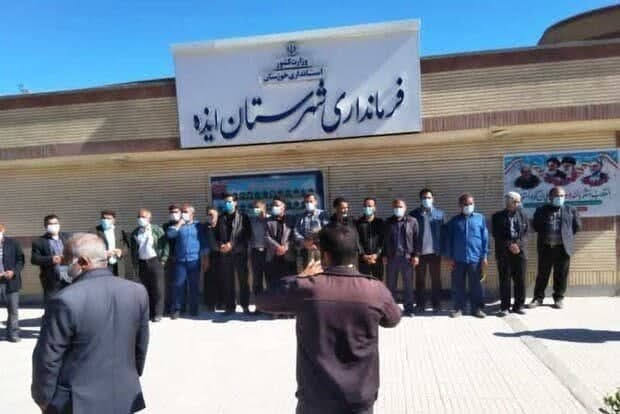On the morning of Saturday, February 13th, irrigation workers gathered in front of the Izeh governor’s office and the water and sewage department to protest the several months of delay in the payment of their wages. Rural irrigators are responsible for water supply and solving problems in the transfer of water to the villages, hence, due to the water shortage crisis especially in arid areas, their work is of particular importance.
Izeh is a small town in one of the southern provinces of Iran called Khuzestan. The surrounding villages are mostly inhabited by seasonal farmers and nomadic people whose lives depend on the water supply to their agricultural lands. The abject poverty of residents in this city and surrounding villages gave rise to a major protest against the repressive government forces in December 2017. While the government officially confirmed the killing of two people during the uprising in the very first days, there were credible reports of the seizure of government buildings in Izeh and the fall of the town’s government. As a result, the city was under siege for nearly a week by armed forces deployed from the surrounding cities. The crackdown was so widespread and severe that no news was heard from the city for a long time. It is still unclear what happened during the siege and the following restoration of government power in the city. Despite the revolt against oppression of the working class, Iran’s government has taken no action to alleviate the difficulties of making a living in the region. According to a village ranger who attended a protest rally on February 13th, the workers in this area are either unemployed or employed without even a temporary contract, a situation which is actually illegal. The so-called temporary contracts in Iran would minimally protect the workers from exploitation. According to the protestors, they were not paid any wages in the past year, and only recently, following repeated protests, they received two months’ worth of salary. Their health insurance and retirement insurance have also been cut off since October. And they have still not received their legally mandated annual bonus for Nowruz (Iranian new year), celebrated last March.
On January 3, 2021, water workers in Kohgiluyeh and Boyer-Ahmad province also gathered in front of the province’s Water and Sewerage Authority to protest at six months of their wages not having been paid and the ambiguity of their employment contracts. The province is another of the poorest in Iran. Long-term delays in the payment of wages – widely practiced in both public and private sectors – is among the most widespread and most serious problems of Iranian workers.



Comment here